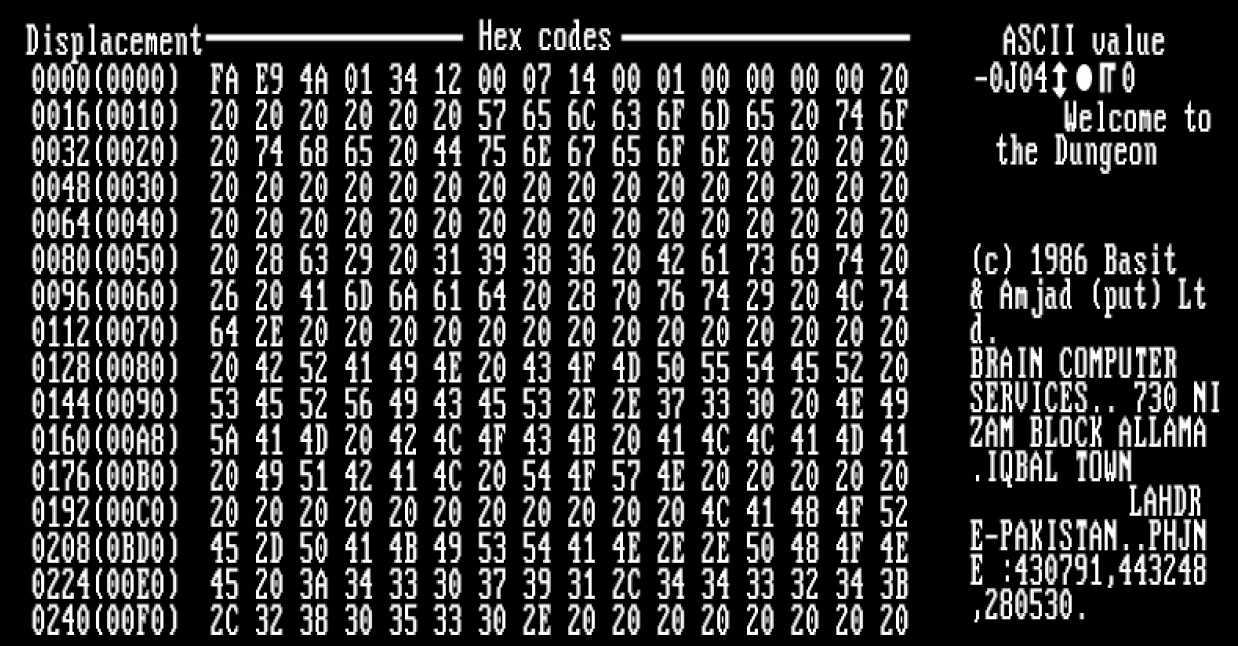|
Archiveus
Archiveus is a computer virus for Microsoft Windows operating systems that is used as a method of extortion. It is a Trojan horse-type ransomware Ransomware is a type of malware from cryptovirology that threatens to publish the victim's personal data or permanently block access to it unless a ransom is paid off. While some simple ransomware may lock the system without damaging any files, ... virus that encrypts the user's files. The user must then purchase something on specific Web sites to obtain the password to decrypt the files. In May 2006, the password protection was cracked. The password for restoring the affected files was found to be "mf2lro8sw03ufvnsq034jfowr18f3cszc20vmw". Further reading * References External links Virus information by Symantec Windows file viruses {{malware-stub ... [...More Info...] [...Related Items...] OR: [Wikipedia] [Google] [Baidu] |
Ransomware (malware)
Ransomware is a type of malware from cryptovirology that threatens to publish the victim's personal data or permanently block access to it unless a ransom is paid off. While some simple ransomware may lock the system without damaging any files, more advanced malware uses a technique called cryptoviral extortion. It encrypts the victim's files, making them inaccessible, and demands a ransom payment to decrypt them. In a properly implemented cryptoviral extortion attack, recovering the files without the decryption key is an intractable problem – and difficult to trace digital currencies such as paysafecard or Bitcoin and other cryptocurrencies are used for the ransoms, making tracing and prosecuting the perpetrators difficult. Ransomware attacks are typically carried out using a Trojan disguised as a legitimate file that the user is tricked into downloading or opening when it arrives as an email attachment. However, one high-profile example, the WannaCry worm, traveled automat ... [...More Info...] [...Related Items...] OR: [Wikipedia] [Google] [Baidu] |
Computer Virus
A computer virus is a type of computer program that, when executed, replicates itself by modifying other computer programs and inserting its own code. If this replication succeeds, the affected areas are then said to be "infected" with a computer virus, a metaphor derived from biological viruses. Computer viruses generally require a host program. The virus writes its own code into the host program. When the program runs, the written virus program is executed first, causing infection and damage. A computer worm does not need a host program, as it is an independent program or code chunk. Therefore, it is not restricted by the host program, but can run independently and actively carry out attacks. Virus writers use social engineering deceptions and exploit detailed knowledge of security vulnerabilities to initially infect systems and to spread the virus. Viruses use complex anti-detection/stealth strategies to evade antivirus software. Motives for creating viruses can inclu ... [...More Info...] [...Related Items...] OR: [Wikipedia] [Google] [Baidu] |
Microsoft Windows
Windows is a group of several proprietary graphical operating system families developed and marketed by Microsoft. Each family caters to a certain sector of the computing industry. For example, Windows NT for consumers, Windows Server for servers, and Windows IoT for embedded systems. Defunct Windows families include Windows 9x, Windows Mobile, and Windows Phone. The first version of Windows was released on November 20, 1985, as a graphical operating system shell for MS-DOS in response to the growing interest in graphical user interfaces (GUIs). Windows is the most popular desktop operating system in the world, with 75% market share , according to StatCounter. However, Windows is not the most used operating system when including both mobile and desktop OSes, due to Android's massive growth. , the most recent version of Windows is Windows 11 for consumer PCs and tablets, Windows 11 Enterprise for corporations, and Windows Server 2022 for servers. Genealogy By marketing ... [...More Info...] [...Related Items...] OR: [Wikipedia] [Google] [Baidu] |
Extortion
Extortion is the practice of obtaining benefit through coercion. In most jurisdictions it is likely to constitute a criminal offence; the bulk of this article deals with such cases. Robbery is the simplest and most common form of extortion, although making unfounded threats in order to obtain an unfair business advantage is also a form of extortion. Extortion is sometimes called the "protection racket" because the racketeers often phrase their demands as payment for "protection" from (real or hypothetical) threats from unspecified other parties; though often, and almost always, such "protection" is simply abstinence of harm from the same party, and such is implied in the "protection" offer. Extortion is commonly practiced by organized crime. In some jurisdictions, actually obtaining the benefit is not required to commit the offense, and making a threat of violence which refers to a requirement of a payment of money or property to halt future violence is sufficient to commit ... [...More Info...] [...Related Items...] OR: [Wikipedia] [Google] [Baidu] |
Trojan Horse (computing)
In computing, a Trojan horse is any malware that misleads users of its true intent. The term is derived from the Ancient Greek story of the deceptive Trojan Horse that led to the fall of the city of Troy. Trojans generally spread by some form of social engineering; for example, where a user is duped into executing an email attachment disguised to appear innocuous (e.g., a routine form to be filled in), or by clicking on some fake advertisement on social media or anywhere else. Although their payload can be anything, many modern forms act as a backdoor, contacting a controller who can then have unauthorized access to the affected computer. Ransomware attacks are often carried out using a Trojan. Unlike computer viruses and worms, Trojans generally do not attempt to inject themselves into other files or otherwise propagate themselves. Use of the term It's not clear where or when the concept, and this term for it, was first used, but by 1971 the first Unix manual assumed its r ... [...More Info...] [...Related Items...] OR: [Wikipedia] [Google] [Baidu] |

